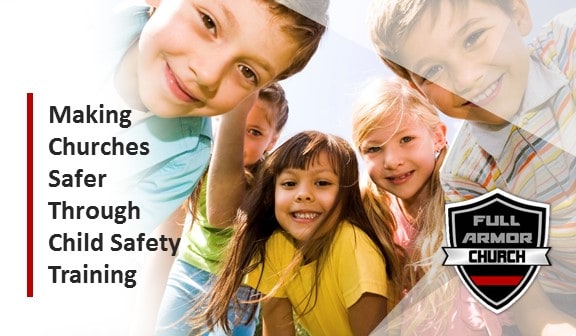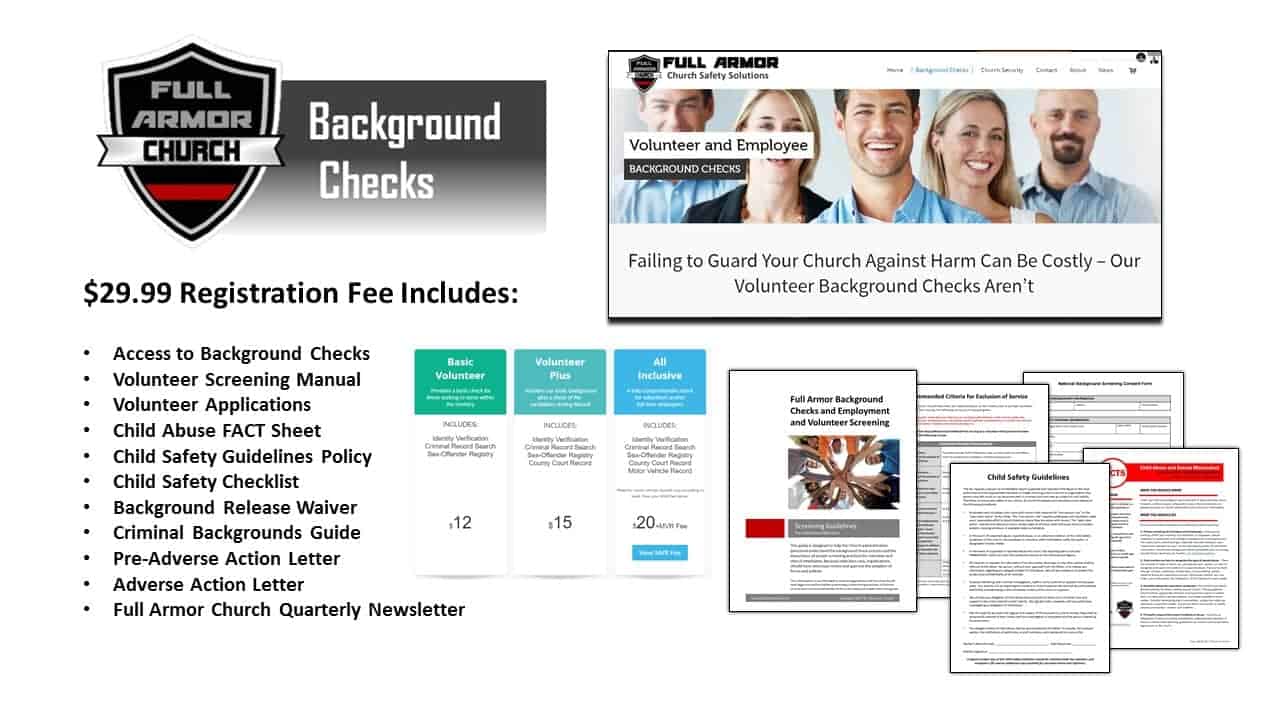Church Background Checks for Volunteers and Employees
Proper Screening Practices are Key
 At Full Armor Church, our goal is to help ministries guard themselves from preventable harm and foreseeable risks and liability. It doesn’t matter how much you have done within a community, it only takes one incident to destroy years of productivity and tarnish your image and effectiveness.
At Full Armor Church, our goal is to help ministries guard themselves from preventable harm and foreseeable risks and liability. It doesn’t matter how much you have done within a community, it only takes one incident to destroy years of productivity and tarnish your image and effectiveness.
Background checks and competent screening practices are a front line of defense in protecting your church and children from harm. Ministries that screen applicants and volunteers are less likely to enter into litigation and will discourage predators and unqualified candidates from seeking to serve.
Establish your screening process
Most ministries are comprised of an entire volunteer workforce. That said, the thought of screening such a wide base of workers can seem to be a daunting task. However, once you have a system in place, it becomes a seamless practice with undeniable benefits. The first step, in developing a solid screening process, is the establishment of policies and protocols by which your ministry will operate. Ministries should utilize the oversight of the local governing board to complete an annual review of their existing policies and regularly modify or revise them as needed. Regardless of the size of your ministry you should work to put the following in place:
-
Written job descriptions for every available position
-
Approved volunteer and employee applications and ministry forms
-
Child safety questionnaires, policies, and child safety training material
Screening is not a single step in the selection process, but a systematic barrier built into the volunteer program itself. Therefore, policies and procedures should be designed to create continual oversight and regulate the activities of those who serve.
For more information on how to guard your ministry, read our article on 10 Essential Steps for Church Safety. You may also want to consider our digital download Church Security and Safety Kit to assist you with forming a solid safety awareness or security program in your church.
Qualifications to serve and bias
It is important that ministries guard their convictions and core beliefs. Therefore, written policies should dictate that service is contingent upon adherence to the doctrines, practices, and published beliefs of your individual church. It is also important to remember that your selection process must be free from any perceived bias or exclusion based solely upon race, age, sex, or physical disabilities.
Nearly 6% of subjects who consent to background checks for faith based organizations have disqualifying offenses.
Every 6 minutes a convicted criminal tries to attain a position inside a non-profit program that is centered around minors.
The #1 reason churches are brought into litigation is for having inadequate child safety measures and screening processes in place.
Conducting Background Checks
 It is always easier to avoid risk than it is to pay the consequences for negligent actions. Conducting background checks will help document the proactive measure your organization is taking to ensure the safety of the children who attend and works towards removing your liability for a lack of due regard for the safety of those children who attend are under your care.
It is always easier to avoid risk than it is to pay the consequences for negligent actions. Conducting background checks will help document the proactive measure your organization is taking to ensure the safety of the children who attend and works towards removing your liability for a lack of due regard for the safety of those children who attend are under your care.
Obtain consent prior to completing background checks
In addition to applications, every candidate seeking to serve should be required to complete a separate background check waiver form. This helps to establish their prior knowledge and qualifies as legal consent for the background check itself. Applicants should also be made aware that supplemental background checks may be completed throughout the term of active service or employment within your organization.
Criminal charges and considerations
Advising applicants of the background check process can assist in obtaining truthful disclosures during the initial screening phase. You should also consider making candidates aware of any disqualifying criminal histories prior to conducting the check. In general, prior convictions for crimes involving children, sex crimes, and crimes of violence should indicate that the individual be disqualified from working with children.
Churches may use individual discretion with lesser crimes involving theft, financial crimes, or drug or alcohol convictions. However, when evaluating the individual circumstances, related to the charges, consider the time frame in which they occurred. It is also suggested that you document any decision and rationale behind your choice to deny or allow service. This can help to show the process you employed, in the event something unfortunate occurs with the related party.
Churches should always seek legal counsel for any areas of concern and ensure they remain in full compliance with any licensing or accreditation standards that oversee their children’s programs or childcare operations.
Record retention and privacy
The information obtained in a criminal background check is to remain confidential and should be secured in digital format or files that are not accessible to the general public. Due to the various state statute of limitations for criminal offenses, it is suggested that you retain volunteer and employee files indefinitely in digital format.
We Have Affordable Safety Options
Full Armor Church assists ministries with their employee and volunteer screening programs and can help protect your children and church from preventable harm and liability.
Visit our page to review our pricing and plan options. We have no monthly or recurring fees.
Background Check Considerations
 Should you conduct background checks on minors who serve?
Should you conduct background checks on minors who serve?
With a parent’s or a guardian’s permission, you can run a criminal background check on a minor who desires to work with children. However, the results obtained will likely be extremely limited. Still, many churches do so to show their due diligence.
How often should you complete background checks?
Unless you have licensing or accreditation standards that dictate otherwise, the frequency of re-running background checks is left to the church’s discretion. It is a good practice to consider annual checks for childcare workers, at a minimum, to ensure they have not committed newer offenses or obtained any disqualifying charges.
Addressing disqualifying criminal histories for employment candidates
Upon review of an applicant’s background, you should make a determination on their eligibility. If the results obtained disqualify an applicant from employment, you must comply with the Fair Credit Reporting Act (FCRA) and do the following:
First, send the Pre-Adverse Action Letter to the applicant or employee’s listed residence. Include a copy of the following:
-
Copy of the Background Check Report received
-
Copy of the Summary of Your Rights included with the report
Secondly, send the Adverse Action Letter to the applicant or employee once they have had the opportunity to respond and contest any records. The FTC has approved a 5 day waiting period between letters, however, we suggest you allow 10 calendar days.
We have included a Background Release Waiver, a Criminal Background Guidelines, and a customizable Pre-Adverse Letter and Adverse Letter form within our background check program.
All Full Armor Background Checks comply with the FCRA requirements. For more information, on employer requirements, visit their website at www.ftc.gov.
Child Safety Considerations
Every church should establish child safety guidelines and procedures for their workers and volunteers. Once adopted, you should make them readily available, published, and incorporate corresponding annual training. A failure to implement adequate safety measures can expose your church to risk and litigation. Even worse, it can attract would be offenders and predators into your program. Although it is important to reduce our risk and exposure to liability, your primary motivation and considerations when developing procedures should be keeping children safe from harm.
Incidents of abuse and allegations can occur in any church and at any time. With that in mind, you should establish sufficient safety barriers for your workers. These child safety policies should be covered during the initial application process and candidates required to sign for receipt and acknowledgement. A Child Safety Guideline and Child Safety Checklist sample has been included for consideration.
Churches should adopt the following child safety practices:
-
All adults and youth who work with or have access to minors, whether employed or volunteer, must be screened and have undergone a criminal background check prior to serving.
-
Adults who have been convicted of sexual or physical abuse against minors or those who have a history of inappropriate conduct with children will not be allowed to serve or participate in any church-sponsored activity or program for minors.
-
Employees and volunteers who work with children and youth shall observe the “two-person rule” or the “open door policy” at ALL times. The “two-person rule” requires employees and volunteers to make every reasonable effort to avoid situations where they are alone with minors. The “open door policy” requires the door be open at all times when there are not two workers present.
-
Volunteers working with children and youth ministries should be members of the church with a minimum of 6 months of active participation, attendance, and a life that models self-control the characteristics of Christ.
-
Develop and train all volunteers and employees on the guidelines and procedures for reporting suspected incidents of abuse or any behavior which seems inappropriate.
Church Background Checks for $12.
Full Armor provides the most cost effective background check solution for churches and faith based organizations. We make safety affordable.
Visit our page to review our pricing and plan options. We have no monthly or recurring fees.




5 Comments
Leave your reply.